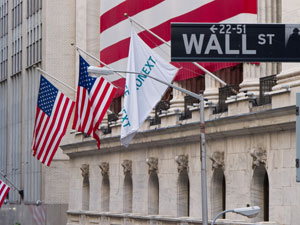 The U.S. Federal Reserve will adjourn its two-day Fed meeting today (Wednesday) as chairwoman Janet Yellen continues to signal for a rate hike by year's end.
The U.S. Federal Reserve will adjourn its two-day Fed meeting today (Wednesday) as chairwoman Janet Yellen continues to signal for a rate hike by year's end.
There will be a lot to discuss at the Fed meeting today. The Fed's decision will come at a time of general malaise in the world markets.
There's the Chinese stock market crash that began at the end of June. After surging about 60%, the leading stock market benchmark gave up about 30%. It has since stabilized, but the panic is still reverberating through the global markets.
"Grexit" has been averted, and Greece remains in the Eurozone. But the recent Greek bailout – the third in five years – represents a capitulation by the Syriza party and continues the hopeless charade of piling more debt on a country that can't service its existing debt. It's short-term medicine that won't cure the underlying issue, which is that Greece can't pay its debts and won't.
Canada is in "technical recession." Commodity prices have crashed, led by gold and silver. Oil prices continue to collapse. And even the U.S. stock market has been pulling back recently.
The International Monetary Fund (IMF) urged the Fed to hold back on rate hikes until 2016.
The concern for many Fed observers right now is that the global economic picture is so moribund and has a stimulative bias - what with Japanese quantitative easing, Eurozone QE, and market-propping measures from the Chinese government - that should the United States raise rates, it will only reinforce a troubling disinflationary path for the U.S.
Though this is a flawed assessment of how U.S. monetary policy is working and has worked over the last seven years...
What to Watch Out For at Fed Meeting Today
QE is not inflationary. Japan has been pumping its economy with stimulus and conducting QE on and off for the last 15 years, and it's still grappling with deflation.
QE isn't about sending a jolt to consumer spending. It's about managing expectations and sentiment, typically on the back of stock market manipulation in the hope that consumers will begin to start spending.
All QE does is bolster bank reserves and push down interest rates. Building up bank reserves doesn't cause inflation in the consumer economy because bank reserves are not lent out and don't funnel into the private sector as cash that will be used to purchase consumer goods. Bank reserves are what banks lend to each other. It's a bank's checking account, and a certain number of reserves must be held against deposits - typically 10% for the largest banks.
If anything, QE is deflationary.
The Fed will typically target a rate and will seek to hit that target through open market operations.
So there's the target rate, the rate the Fed wants banks to lend to each other, and the effective rate, the actual rate at which they lend to each other in the Fed funds market.
When excess reserves are scarce, there will be higher demand from banks with insufficient reserves. This will bid up the interest rate to borrow Fed funds as the bank with excess reserves will see a profit opportunity.
This helps to set rates across asset classes because when the rate is high for banks to borrow from each other, they'll have to lend at an even higher rate to remain profitable.
But if the Fed steps in and begins buying up banks' bonds with newly created reserves, it drives down the demand on the Fed funds market, bringing interest rates down.
In QE, these excess reserves become so abundant - at this point more than $2.5 trillion - that demand is low and rates stay low.
[epom key="ddec3ef33420ef7c9964a4695c349764" redirect="" sourceid="" imported="false"]
None of this has an impact on consumer prices. What does have an impact on consumer prices are the low interest rates. When QE causes a low interest rate environment across asset classes in the economy, it has the effect of lowering the amount of interest income being spent into the private sector. QE causes low rates, and low rates starve savers of interest income that could be used to pay for consumer goods.
That's why raising rates won't spark a bigger deflationary trend in the United States, and why those fears are unfounded.
The whole purpose of QE was to spark another type of inflation: asset inflation. Banks can draw down these reserves and buy assets. It also drives investors out of debt-bearing investments such as bonds and into the stock market.
A rising stock market supposedly creates a "wealth effect." That is, it's supposed to spur some psychologically driven spending spree for consumers who excitedly watch the Dow Jones Industrial Average and S&P 500 climb to new highs routinely.
The truth is that the Fed is just feeding Wall Street at the expense of the consumers. Savers are missing out on interest income while the stock market benefits.
Yellen doesn't want the party to end on Wall Street. That's why she's so reluctant to let interest rates rise.
Jim Bach is an Associate Editor at Money Morning. You can follow him on Twitter @JimBach22.
Where else in the economy is spending anemic? Look no further than the housing market...


